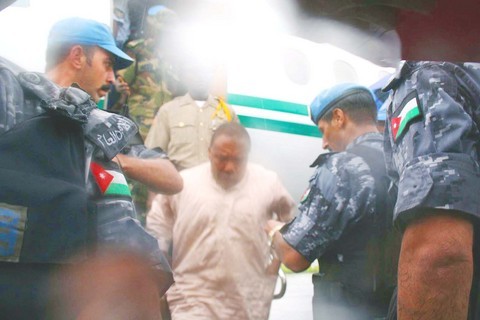Liberia's one-time warlord Charles Taylor was in the hands of Sierra Leone's tribunal yesterday, where he is set to become the first-ever African head of state tried on war crimes charges by an international court.
Taylor has been indicted by the UN-backed tribunal on 11 counts of crimes against humanity stemming from his support for brutal rebels in Sierra Leone. His arrival in handcuffs at the court on Wednesday represented a watershed moment for West Africa, a region long shaken by Taylor's warmaking.
"Today is a momentous occasion, an important day for international justice, the international community and above all the people of Sierra Leone," said Desmond de Silva, chief prosecutor of the tribunal called the Special Court.

PHOTO: AP
"His presence in the custody of the Special Court sends out the clear message that no matter how rich, powerful or feared people may be, the law is above them," de Silva said.
Nigerian police captured the exiled former Liberian president late on Tuesday as he tried to leave Nigeria, where he has lived in the south since stepping down from power during a 2003 rebel attack. He was caught trying to slip across the northern Nigerian border with Cameroon with his son, an aide-de-camp and a local guide, along with two 50kg sacks filled with US dollars and euros, Nigerian police official Alhaji Mohammed Aminu Bello said.
UN peacekeepers ferried Taylor by helicopter to the court, where de Silva said he was read his arrest warrant and would make his first court appearance by the end of this week.
Taylor joined nine other defendants, also charged with crimes committed during Sierra Leone's brutal 1989-2002 civil war. Taylor, a bombastic speechmaker during his time in the bush and as Liberia's president, made no comment.
The charges against Taylor stem from his support of the Revolutionary United Front rebels that terrorized civilians in Sierra Leone for years, chopping off the arms, legs, ears and lips of their victims.
On March 3, 2003, Taylor was indicted on 17 counts alleging war crimes, crimes against humanity and other serious violations of international humanitarian law for backing the rebels during the war. De Silva said that on March 16, 2006, the judge of the Special Court approved an amended indictment of 11 counts, which he said "will ensure a more focused trial."
The court began trials in 2004, but Taylor was their highest-profile defendant and the first African head of state to face trial on war-crimes charges.
Meanwhile, the US is seeking to move the war crimes trial of Taylor from Sierra Leone to the Netherlands for security reasons, US officials said.
US Ambassador John Bolton said that Taylor would remain under the jurisdiction of the Special Court, "but where he is physically may be somewhere else. The court's jurisdiction is not tied to a particular physical location."
Bolton said where Taylor goes for trial "will be determined in a few days."

A fire caused by a burst gas pipe yesterday spread to several homes and sent a fireball soaring into the sky outside Malaysia’s largest city, injuring more than 100 people. The towering inferno near a gas station in Putra Heights outside Kuala Lumpur was visible for kilometers and lasted for several hours. It happened during a public holiday as Muslims, who are the majority in Malaysia, celebrate the second day of Eid al-Fitr. National oil company Petronas said the fire started at one of its gas pipelines at 8:10am and the affected pipeline was later isolated. Disaster management officials said shutting the

US Vice President J.D. Vance on Friday accused Denmark of not having done enough to protect Greenland, when he visited the strategically placed and resource-rich Danish territory coveted by US President Donald Trump. Vance made his comment during a trip to the Pituffik Space Base in northwestern Greenland, a visit viewed by Copenhagen and Nuuk as a provocation. “Our message to Denmark is very simple: You have not done a good job by the people of Greenland,” Vance told a news conference. “You have under-invested in the people of Greenland, and you have under-invested in the security architecture of this

UNREST: The authorities in Turkey arrested 13 Turkish journalists in five days, deported a BBC correspondent and on Thursday arrested a reporter from Sweden Waving flags and chanting slogans, many hundreds of thousands of anti-government demonstrators on Saturday rallied in Istanbul, Turkey, in defence of democracy after the arrest of Istanbul Mayor Ekrem Imamoglu which sparked Turkey’s worst street unrest in more than a decade. Under a cloudless blue sky, vast crowds gathered in Maltepe on the Asian side of Turkey’s biggest city on the eve of the Eid al-Fitr celebration which started yesterday, marking the end of Ramadan. Ozgur Ozel, chairman of the main opposition Republican People’s Party (CHP), which organized the rally, said there were 2.2 million people in the crowd, but

JOINT EFFORTS: The three countries have been strengthening an alliance and pressing efforts to bolster deterrence against Beijing’s assertiveness in the South China Sea The US, Japan and the Philippines on Friday staged joint naval drills to boost crisis readiness off a disputed South China Sea shoal as a Chinese military ship kept watch from a distance. The Chinese frigate attempted to get closer to the waters, where the warships and aircraft from the three allied countries were undertaking maneuvers off the Scarborough Shoal — also known as Huangyan Island (黃岩島) and claimed by Taiwan and China — in an unsettling moment but it was warned by a Philippine frigate by radio and kept away. “There was a time when they attempted to maneuver